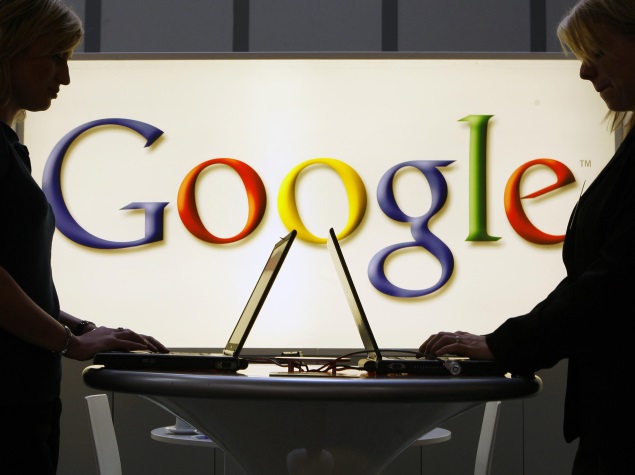- Home
- Laptops
- Laptops News
- Google Waxes Poetic About Spread of Chromebooks to 9 More Countries
Google Waxes Poetic About Spread of Chromebooks to 9 More Countries

"Chromebooks are coming to nine more nations; to improve computing for all generations," Google marketing executive and 'occasional versifier' David Shapiro said in a rhyming blog.
Subsequent verses were dedicated to Chromebooks going to Norway, Denmark, Chile, Mexico, Spain, Italy, Belgium, New Zealand, and the Philippines.
"When Chromebooks in these countries alight," Shapiro said in poetic form.
"We hope our new global friends find some computing delight."
The new nations will bring to 25 the number of countries where Chromebooks are sold, according to Google.
The California-based technology titan's drive to put the future of personal computing firmly in the Internet "cloud" got a boost on last month from chip titan Intel and hardware giants including Lenovo.
(Also see: Intel and Lenovo Show Support for Google's Chromebooks)
The leading computer maker joined Acer, Dell, Toshiba, Hewlett-Packard, Asus, and LG Electronics to introduce an array of new Chromebooks, many powered by newer-generation Intel chips that promise improved performance and battery life.
(Also see: HP Slatebook PC Launched Alongside a Refreshed Chromebook PC)
The array of Chromebooks coming to market includes the first one from Lenovo aimed directly at home lives instead of work lives. China-based Lenovo is the world's leading personal computer company.
Popularity of a Lenovo Chromebook tailored for students in schools prompted the company to create a model for use outside of class, according to Lenovo "ambassador" Ashley Rodrigue.
"We have seen significant momentum and traction on the Chrome side of the house," Rodrigue told AFP at the unveiling last month.
"Because of that, we have taken a look elsewhere at the growth of Chrome."
Chrome challenges the traditional model of installing and maintaining programs on machines, instead letting devices serve as doorways to applications or services hosted at data centers connected to the Internet.
Chromebooks are also known for bargain prices. For example, Lenovo models will start at $279.
(Also see: Lenovo Announces Consumer-Facing N20 and N20p Chromebooks)
Shifting operating software to banks of servers online means that Google updates programs and fends off hackers and malicious software.
Google introduced the first Chromebook in mid-2010 in a challenge to Windows operating software at the heart of Microsoft's empire.
Since then, the list of Chromebook makers has steadily grown and Chrome "boxes" designed for desktop computing have been added to the line-up.
Catch the latest from the Consumer Electronics Show on Gadgets 360, at our CES 2026 hub.
Related Stories
- Samsung Galaxy Unpacked 2025
- ChatGPT
- Redmi Note 14 Pro+
- iPhone 16
- Apple Vision Pro
- Oneplus 12
- OnePlus Nord CE 3 Lite 5G
- iPhone 13
- Xiaomi 14 Pro
- Oppo Find N3
- Tecno Spark Go (2023)
- Realme V30
- Best Phones Under 25000
- Samsung Galaxy S24 Series
- Cryptocurrency
- iQoo 12
- Samsung Galaxy S24 Ultra
- Giottus
- Samsung Galaxy Z Flip 5
- Apple 'Scary Fast'
- Housefull 5
- GoPro Hero 12 Black Review
- Invincible Season 2
- JioGlass
- HD Ready TV
- Laptop Under 50000
- Smartwatch Under 10000
- Latest Mobile Phones
- Compare Phones
- Honor Magic 8 RSR Porsche Design
- Honor Magic 8 Pro Air
- Infinix Note Edge
- Lava Blaze Duo 3
- Tecno Spark Go 3
- iQOO Z11 Turbo
- OPPO A6c
- Samsung Galaxy A07 5G
- Lenovo Yoga Slim 7x (2025)
- Lenovo Yoga Slim 7a
- Lenovo Idea Tab Plus
- Realme Pad 3
- Moto Watch
- Garmin Quatix 8 Pro
- Haier H5E Series
- Acerpure Nitro Z Series 100-inch QLED TV
- Asus ROG Ally
- Nintendo Switch Lite
- Haier 1.6 Ton 5 Star Inverter Split AC (HSU19G-MZAID5BN-INV)
- Haier 1.6 Ton 5 Star Inverter Split AC (HSU19G-MZAIM5BN-INV)







![[Sponsored] Haier C90 OLED TV | Dolby Vision IQ, 144Hz OLED and Google TV in Action](https://www.gadgets360.com/static/mobile/images/spacer.png)









